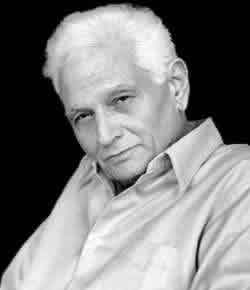Jacques Derrida Quotes
What cannot be said above all must not be silenced but written.
Such a caring for death, an awakening that keeps vigil over death, a conscience that looks death in the face, is another name for freedom.
No one gets angry at a mathematician or a physicist whom he or she doesn't understand, or at someone who speaks a foreign language, but rather at someone who tampers with your own language.
Psychoanalysis has taught that the dead - a dead parent, for example -- can be more alive for us, more powerful, more scary, than the living. It is the question of ghosts.
Monsters cannot be announced. One cannot say: 'here are our monsters', without immediately turning the monsters into pets.
What is called "objectivity," scientific for instance (in which I firmly believe, in a given situation) imposes itself only within a context which is extremely vast, old, firmly established, or rooted in a network of conventions … and yet which still remains a context.
One of the definitions of what is called deconstruction would be the effort to take this limitless context into account, to pay the sharpest and broadest attention possible to context, and thus to an incessant movement of recontextualization.
Learning to live ought to mean learning to die - to acknowledge, to accept, an absolute mortality - without positive outcome,or resurrection, or redemption, for oneself or for anyone else. That has been the old philosophical injunction since Plato: to be a philosopher is to learn how to die.
I would say that deconstruction is affirmation rather than questioning, in a sense which is not positive: I would distinguish between the positive, or positions, and affirmations. I think that deconstruction is affirmative rather than questioning: this affirmation goes through some radical questioning, but it is not questioning in the field of analysis.
If you read philosophical texts of the tradition, you'll notice they almost never said 'I,' and didn't speak in the first person. From Aristotle to Heidegger, they try to consider their own lives as something marginal or accidental. What was essential was their teaching and their thinking. Biography is something empirical and outside, and is considered an accident that isn't necessarily or essentially linked to the philosophical activity or system.
I take great interest in questions of language and rhetoric, and I think they deserve enormous consideration; but there is a point where the authority of final jurisdiction is neither rhetorical nor linguistic, nor even discursive. The notion of trace or of text is introduced to mark the limits of the linguistic turn. This is one more reason why I prefer to speak of 'mark' rather than of language. In the first place the mark is not anthropological; it is prelinguistic; it is the possibility of language, and it is every where there is a relation to another thing or relation to an other. For such relations, the mark has no need of language.
That philosophy died yesterday, since Hegel or Marx, Nietzsche, or Heidegger—and philosophy should still wander toward the meaning of its death—or that it has always lived knowing itself to be dying... that philosophy died one day, within history, or that it has always fed on its own agony, on the violent way it opens history by opposing itself to nonphilosophy, which is its past and its concern, its death and wellspring; that beyond the death, or dying nature, of philosophy, perhaps even because of it, thought still has a future, or even, as is said today, is still entirely to come because of what philosophy has held in store; or, more strangely still, that the future itself has a future—all these are unanswerable questions. By right of birth, and for one time at least, these are problems put to philosophy as problems philosophy cannot resolve.
I wouldn't use the term "a god," but what interests me in this statement is that Heidegger was anti-religious. He was raised Catholic, but he vehemently rejected Christianity, so the god he refers to is not the god we know. He refers to a god who not only hasn't come yet, but perhaps doesn't exist. He gives the name of god to the one who is hoped for, and implies that the one who'd come and save us will have the name of god. I don't agree with this if it encourages hope for salvation, but if the statement means that we're waiting for the arrival of an unpredictable one, and that we must be hospitable to the coming of this one, then I've got no objection. This is a form of what I'd describe as messianicity without messianism, and we are by nature messianic. We cannot not be, because we exist in a state of expecting something to happen.
How can another see into me, into my most secret self, without my being able to see in there myself? And without my being able to see him in me. And if my secret self, that which can be revealed only to the other, to the wholly other, to God if you wish, is a secret that I will never reflect on, that I will never know or experience or possess as my own, then what sense is there in saying that it is my secret, or in saying more generally that a secret belongs, that it is proper to or belongs to some one, or to some other who remains someone. It's perhaps there that we find the secret of secrecy. Namely, that it is not a matter of knowing and that it is there for no one. A secret doesn't belong, it can never be said to be at home or in its place. The question of the self: who am I not in the sense of who am I but rather who is this I that can say who? What is the- I and what becomes of responsibility once the identity of the I trembles in secret?

